Let’s take a trip to Arizona’s Tucson desert where you can find a startling number of military aircrafts lined up in the scorching heat, left seemingly abandoned. Microsoft Bing has been able to create a mesmerizing view of this sight – The Boneyard – by making use of satellite imaging and the view allows users to look around the area in 3D with an amazing level of detail. You ‘d be surprised to know that The Boneyard is equal to the size of 1300 football pitches.
The Boneyard has A10 Thunderbolts, F-14 Tomcat fighters along with Hercules freighters as well. The planes seem to go on as one takes a stroll through this desert. Some of them seem to be parked recently while others have been covered with protective covers that keep the nature away from them. The base is home to the 309th Aerospace Maintenance and Regeneration Group (309 AMARG) that executes repairs of these aircrafts and sometimes sees some of them flying again too.
The worth of this base is $35billion and these outdated planes are kept as spare parts for the models that are currently in service at the Davis-Monthan Air Force Base in Arizona. There is a total of 4,200 planes over here and while some of these are merely in between deployments, more than 80% are accustomed to calling this place home. The Boneyard has a total of 350,000 items that can be used if need arises and they range from engines to electronics, all of which have been recycled so as to reduce the cost of maintenance of fleet in use currently. In 2005, parts worth $568million were recycled.
Nick Veronico, aviation author, said, “As long as there are aircraft flying, military and commercial aircraft boneyards will always be necessary to keep other planes in the air. Each of the storage yards typically performs a variety of functions from storing aircraft that are temporarily out of service but expected to return to the fleet, to reclaiming useable parts which are inspected, overhauled, and then held until needed by active aircraft, to dismantling of the aircraft carcasses.”
Some may ask, why a desert? The answer is based on logical reasoning. Desert offers low humidity and rainfall and therefore, cuts down the chances of rust occurrence. The hardened soil also makes it easier to park aircrafts without having the need of build concrete ramp. The military has been using Davis-Monthan for 60 years as a facility for plane storage.
Planes that have served on aircraft carriers need to be washed in order to remove the salt and all these aircrafts have their fuel tank lines drained. All the explosives are removed. Ducts are usually covered with tape while the aircrafts are painted in white to combat the sun rays.
Check out the amazing Boneyard in the video below and let us know what you think!
